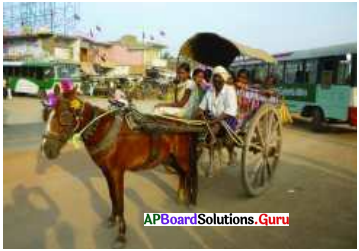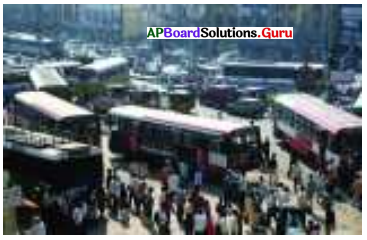AP State Syllabus 7th Class Social Important Questions 10th Lesson Importance of Transport System
Question 1.
What is the raw material? Give one example.
Answer:
Materials required to produce a commodity are called raw materials.
Examples: Bamboo is a raw material for paper, silk is a raw material for Dharmavaram sarees.
Question 2.
How is the transport system helpful to the farmers in your area.
Answer:
- In order to produce food, farmers need certain resources, such as seed, fertilizers, pesticides, packaging materials and many others. Precisely because of that, transport is an essential aspect of crop production that enables the delivery of agricultural resources to a farmer.
- After, every harvested Crop needs to be transported, either directly from the field to the market or to the packing house and storage.
Marks Question
![]()
Question 3.
Define child labour? Write any two causes of child labour.
Answer:
Child labour:
The employment of children in an industry or business, especially when illegal or considered exploitative. (OR)
Child labour:
Child labour refers to making Children work so that they are unable to attend schools and perform other childhood activities.
Causes of Child labour:
- Poverty,
- Illiteracy of parents
- Inaccessibility of schools,
- Lack of quality education etc.
Question 4.
‘Transport System is important in the development of a country.” Write your opinion in your own words about this statement.
Answer:
The transport system is important for country progress and this transport is added high speed and efficiency to the country progress.
It has good physical connectivity in the part of an urban area which is important for economic growth.
It provides proper tourism transportation in a proper manner on the other hand industrialization is well exceed according to the transportation.
![]()
Question 5.
Krishna and Ibrahim study in a school in the same class. They live in different places but the distance from their house to school is three kilometres. Ibrahim comes to school on the city bus whereas Krishna travels by school bus. What could be reasons for families of these students to travel by different bus services?
Answer:
Krishna’s family is a rich or higher middle-class family whereas Ibrahim’s family is a lower middle class or poor family.
Question 6.
What are the means of transport?
Answer:
The means of transport are
- Roadways
- Railways
- Airways
- Waterways.
Question 7.
Observe the pictures and answer the questions.


a. What is the difference between these two vehicles?
Answer:
- Horse cart – It is manual.
- Bus – It is mechanical and manual.
b. How many wheels are there for the cart?
Answer:
There are two wheels.
![]()
c. Which is preferable in the rainy season?
Answer:
The bus is preferable in the rainy season.
d. Which is the modern means of transport?
Answer:
The bus is the modern means of transport.
e. Which vehicle do you like?
Answer:
I like car.
Question 8.
Read the following passage and answer the questions.
Roads: In India, most roads are built and maintained by the government. Roads are of different types. Some roads are called National Highways built across different states in the country. For instance, a road network called National Highway No.7 (or 44) runs through Uttar Pradesh, Madhya Pradesh, Maharashtra, Telangana, Andhra Pradesh, Karnataka and Tamilnadu. While the Andhra Pradesh state government maintains roads connecting small towns and districts, Panchayats are responsible for village roads many of which are made of gravel. Corporations and Municipalities are responsible for urban roads. Roads laid along international boundaries are called border roads.
a. Who maintain roads in India?
Answer:
In India, most roads are built and maintained by the government.
b. Which roads are called National Highways?
Answer:
The roads built across different states in the country are called National Highways.
c. Through which states do the NH7 run?
Answer:
National Highway No.7 (or 44) runs through Uttar Pradesh, Madhya Pradesh, Maharashtra, Telangana, Andhra Pradesh, Karnataka and Tamilnadu.
d. What are responsible for village roads?
Answer:
Panchayats are responsible for village roads.
e. What are responsible, for urban roads?
Answer:
Corporations and Municipalities are responsible for urban roads.
![]()
Question 9.
Read the following passage and answer the questions.
Waterways: Almost all goods traded by Indian traders have been transported to other countries through ports. Port cities or towns are thus major trading centres. Andhra Pradesh has 15 ports out of which Visakhapatnam is the largest port. Rivers s>nch as the Godavari, the Krishna and the Penna and their canals are used as waterways.
a. What is the importance of seaports?
Answer:
Almost all goods traded by Indian traders are transported to other countries through ports.
b. What are major trading centres?
Answer:
Port cities or towns are major trading centres.
c. How many seaports are there in Andhra Pradesh?
Answer:
There are 15 ports in Andhra Pradesh.
d. What is the largest seaport in Andhra Pradesh?
Answer:
Visakhapatnam is the largest port in Andhra Pradesh.
e. What are the rivers in Andhra Pradesh?
Answer:
The Godavari, the Krishna and the Penna are important rivers in Andhra Pradesh.